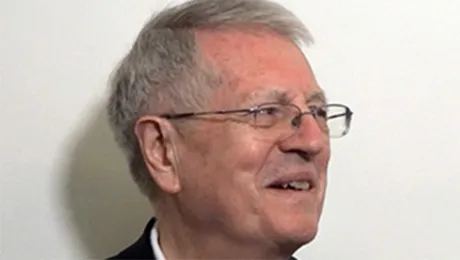'Scripture alone' is a known Lutheran principle. At the second Bible year webinar, two Biblical scholars reflected on how this is used in understanding the Bible.

Professor Dr Jerzy Sojka (left), Chair of Historical Theology at the Christian Theological Academy in Warsaw and Prof. Dr Ángela del Consuelo Trejo Haager (right), Professor of Bible and gender theology and coordinator of the Augsburg Lutheran Seminary in Mexico.
Mexican professor Ángela Trejo and Polish professor Jerzy Sojka reflect on Lutheran methods of Biblical interpretation
(LWI) - What is distinctive about the way in which Lutherans read and interpret the Bible? What tools can we draw on to help us understand Scripture better? And how do we deal with difficult passages or divisive interpretations which threaten to tear Christian communities apart?
Those far-reaching questions were discussed by two leading Lutheran theologians during the second of a four-part webinar series marking the 500th anniversary of Luther’s ‘September Testament’, the name given to his ground-breaking translation of the gospels from the original, first century Greek into the German language spoken by ordinary people of his day.
Hungarian doctoral student, Rev. Szabolcs Nagy, who was moderating the discussion, began by noting the importance of the principle of ‘Sola Scriptura’ or Scripture alone as the supreme authority for all matters of faith and Christian living. As Lutherans, he said, we are proud of this Reformation tradition, but how do we explain those Biblical narratives that appear to contradict each other?
Not only ‘Sola Scriptura’
Polish professor Dr Jerzy Sojka from the Christian Theological Academy in Warsaw, emphasized that ‘Sola Scriptura’ must never be understood in isolation, but rather “needs to be interwoven” with the other accompanying principles of ‘Solus Christus’, Sola Gratia’, Sola Fide [Christ alone, Grace alone, Faith alone]. Putting these principles together, he said, and listening to the preaching of the Word can help us as we “try to find the work of Christ” in our reading of the Bible.
Another tool to help us in this task, he continued, is the distinction we make between “the law as a diagnosis of man as a sinner,” and “the gospel as the good news about our salvation.” Furthermore, Sojka said, Luther himself reminds us that there are two dimensions to a correct understanding of the Bible: an “external one,” which requires knowledge of the language and historical context of the text, but also an “internal one,” which requires us to trust that the Holy Spirit will “work in our hearts.”
Humility is essential, together with an awareness that we are “part of a much broader discussion within the church, not only of our own times, but through the whole history of Christianity.”
Professor Dr Jerzy Sojka, Chair of Historical Theology at the Christian Theological Academy in Warsaw, Poland.
In a similar way, he said, Luther speaks of “two kingdoms, two regiments or two realms”: a worldly one in which we are “led by reason,” and a spiritual one in which we are led by the Word of God. Humility is essential in reading the Bible, together with an awareness that we are part of “a much broader discussion within the church, not only of our own times, but through the whole history of Christianity.” When faced with texts that baffle us or seem to contradict each other, Sojka added, we need to be aware that “in this moment, maybe, we touch the hidden essence of God, something that cannot be communicated, but is part of our Christian experience” in reading the texts.
Reflecting on how to overcome division and conflict about biblical interpretation, Sojka said it is crucial to be aware that interpretation is a dynamic process and that we “don’t have all the answers.” Courage is needed “to face our differences” and to “ask ourselves why our partner reads Scripture in this way,” because it “could help us” too, he said. When thinking of Lutheran World Federation’s reconciliation processes with Jews or Mennonites, Sojka added, we recall that “even our heroes of the Reformation could use Scripture in the worst possible way to justify harm to other people.”
Feminist Biblical hermeneutics
Also sharing her thoughts on Lutheran and feminist interpretations of the Bible was the coordinator of the Augsburg Lutheran Seminary in Mexico and professor of Bible and gender theology, Rev. Dr Ángela del Consuelo Trejo Haager. She noted how Luther emphasized the importance of Biblical translation “making it possible for regular people to interpret it in their own language.” But during those early years of the Reformation, she continued, there were also women who translated sections of Scripture and gathered together “to understand the Bible from their perspective.”
Seeing Christ at the center of the narrative, yet relating it our own searches for grace, justice and mercy, can help us “get closer to the Bible,” she said. Though the Lutheran motto is ‘Scripture alone’, she added, the historical perspective of our church “has helped us to find these breaches and cracks, to see in other writings, in other spaces, that it is possible to find other hermeneutical ideas that can aid in our reflections.”
Yes, the Bible can be revised, reformulated, reread and interpreted to answer to different contexts.
Rev. Dr Ángela del Consuelo Trejo Haager, Professor of Bible and gender theology and coordinator of the Augsburg Lutheran Seminary in Mexico.
It is important to keep in mind, Trejo continued, “that, yes, the Bible can be revised, reformulated, reread and interpreted to answer to different contexts.” This is “the greatness of Lutheran hermeneutics,” she insisted, that “Christ can rise anywhere and offer a path to freedom, to inclusion, to reconciliation at every moment,” in every community which keeps Christ at the center.
Feminist Biblical hermeneutics, Trejo said, have “opened many paths for us,” offering “the possibility of seeing the texts from different perspectives.” Understanding “the lived contexts” of a narrative can help us to “examine the power structures that were causing harm to women” in Biblical times. At the same time, she noted, analyzing the texts "through my own experience, through our own wisdom” enables me “to bring change to my environment and my context.”
Within “patriarchal structures and sexist systems,” Trejo noted, this work will always be contentious. But it can also “build bridges with other stakeholders,” providing interpretations “that are inclusive, that cure, that heal wounds, and simultaneously move us to find fairer and much more equitable spaces.” Describing them as “a dance that constantly helps us think from different standpoints,” she said feminist hermeneutics highlight the “corporeality of the gospel,” which can promote justice and peace through “more empathetic relationships with others.”
The next webinar in this series will be held on 6 December, focusing on the theme of ‘Engaging the Bible’.
Understanding the Bible
Understanding the Bible – a webinar on 8 November 2022. This was the second of four Bible year webinars.
Speakers:
- Professor Dr Jerzy Sojka
- Professor Dr Ángela del Consuelo Trejo Haager


